

BEIJING, Nov. 27 -- China's plan to reorganize its military administration structure and command system will not affect the country's defense policy, which is "defensive in nature," a spokesman for the Ministry of National Defense said on Friday.
Yang Yujun told a press conference that "Chinese armed forces will always be a staunch force for world peace and regional stability," after President Xi Jinping announced the reshuffle at a meeting concluded on Thursday, which would reinforce the "centralized and unified" leadership of the Central Military Commission (CMC) over the armed forces.
Xi told the meeting, which was attended by more than 200 high-ranking military officers and officials, that the current regional military commands will be regrouped into new battle zone commands under the CMC.
In September, Xi announced a cut of 300,000 troops, which "again demonstrated China's commitment to peaceful development," said Yang when asked if the overhaul meant an adjustment to national defense policy.
He said the reform was intended to "make breakthroughs in military administration and joint operational command, optimize the military structure, enhance policy systems and civilian-military integration, and build a modern military with Chinese characteristics that can win informationized wars."
The spokesman cited profound and complicated changes in the international situation and the task to build a strong army to better fulfill its missions as reasons for the reform.
"It will focus on removing institutional and structural barriers that had constrained military development to boost modernization of the military and cultivate the fighting capacity of troops," he said.
The reorganization will help build a strong military force that suits China's international status, fits its national security interests and provides a guarantee for the "Chinese dream" of rejuvenating the Chinese nation.
NEW LEADERSHIP MECHANISM
Yang said the CMC will have multiple departments, focusing on its core functions of supervision and coordination, adding that a large number of departments and staff will be cut and units affiliated to it will be reduced substantially.
The reform will establish a "CMC - battle zone commands - troops" command system and an administration system that runs from the CMC through various services to the troops.
Zhao Xiaozhuo of the PLA Academy of Military Science said decision-making in modern warfare must be "fast and decisive" so as to "grasp fleeting opportunities," which calls for separating military development from the command system.
Zhao said the "CMC - battle zone commands - troops" command system will help the Party and the CMC centralize the leadership, further consolidating the basic principle that "the CPC has absolute leadership of the armed forces."
One of the reform objectives is to form a new leadership body for the People's Liberation Army (PLA) army, the ground troops.
Yang said the PLAA leadership was previously shared by four general headquarters, including those responsible for staff, politics, logistics and armaments.
A new leadership mechanism will strengthen the top-level design of the ground forces, raise management efficiency and step up modernization of the army, he said.
The fact that the PLAA lacks a unified command center is a sign that China's military still holds the "army prevails" thought, which does not fit increasingly complicated warfare demands, said Lou Yaoliang, a military expert.
The old system has gradually fallen out of sync with changing situations, causing fragmentation, redundancy and divided policies, said Yin Zhuo, director of the Expert Consultation Committee of the PLA Navy.
Reorganizing the four general headquarters into various military departments under the CMC will ensure efficient military order, Yin said.
FIGHTING CORRUPTION
Yang said the reform also stresses the importance of regulating power within the military, demanding a strict system to supervise the use of power.
A new discipline inspection commission will be established within the CMC, and disciplinary inspectors will be sent to CMC departments and battle zone commands, according to the reform plan.
The CMC will have an audit office and a political and legal affairs commission. The independent and fair use of judicial power by military courts and procuratorates will be ensured through adjustments to the military judicial system.
Yang said it is important to promote the integrated development of military and civilian sectors as well as economy and defense.
The reform also stresses veteran management and resettlement. Veterans are valuable to the Party and country, he added, as they have completed strict training and important tasks, and they will be granted special job placement policies upon transfer or retirement.
Yang said the termination of all paid services in the military is "an important decision" by the CPC Central Committee, the CMC and Chairman Xi to "purify the air" and ensure the PLA's quality.
 Contestants of Mrs. Globe pose for photo in Shenzhen
Contestants of Mrs. Globe pose for photo in Shenzhen
 Bikini models attend hot pot banquet in Hefei
Bikini models attend hot pot banquet in Hefei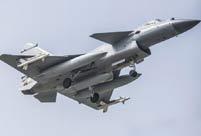 J-10B fighters with homegrown engine in test fligh
J-10B fighters with homegrown engine in test fligh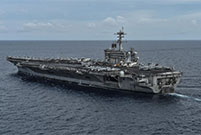 Photos of U.S. Navy intruding in South China Sea released
Photos of U.S. Navy intruding in South China Sea released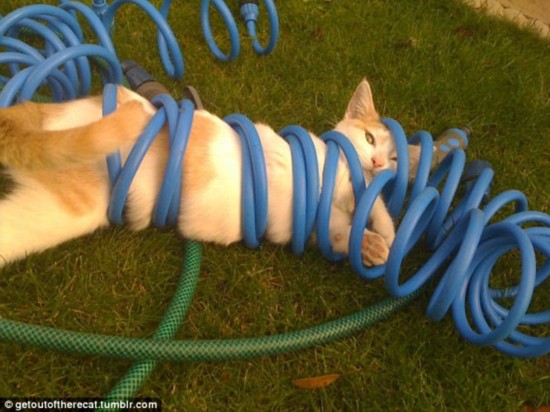 Cats who immediately regretted their life choices in photographs
Cats who immediately regretted their life choices in photographs Beautiful girl from police college becomes Internet hit
Beautiful girl from police college becomes Internet hit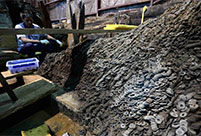 10 tons of copper coins unearthed in 2,000-yr old tomb
10 tons of copper coins unearthed in 2,000-yr old tomb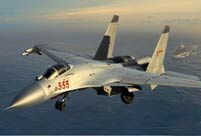 In Pics: Amazing Chinese fighters
In Pics: Amazing Chinese fighters
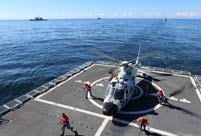 Chinese, U.S. navies hold first-ever joint exercise in the Atlantic
Chinese, U.S. navies hold first-ever joint exercise in the Atlantic Top 20 hottest women in the world in 2014
Top 20 hottest women in the world in 2014 Top 10 hardest languages to learn
Top 10 hardest languages to learn 10 Chinese female stars with most beautiful faces
10 Chinese female stars with most beautiful faces China’s Top 10 Unique Bridges, Highways and Roads
China’s Top 10 Unique Bridges, Highways and Roads Sun seekers
Sun seekers Sex toy industry lacks govt oversight
Sex toy industry lacks govt oversight Military reform matches China’s evolution
Military reform matches China’s evolution Genetically engineered fish gets US FDA stamp of approval
Genetically engineered fish gets US FDA stamp of approvalDay|Week